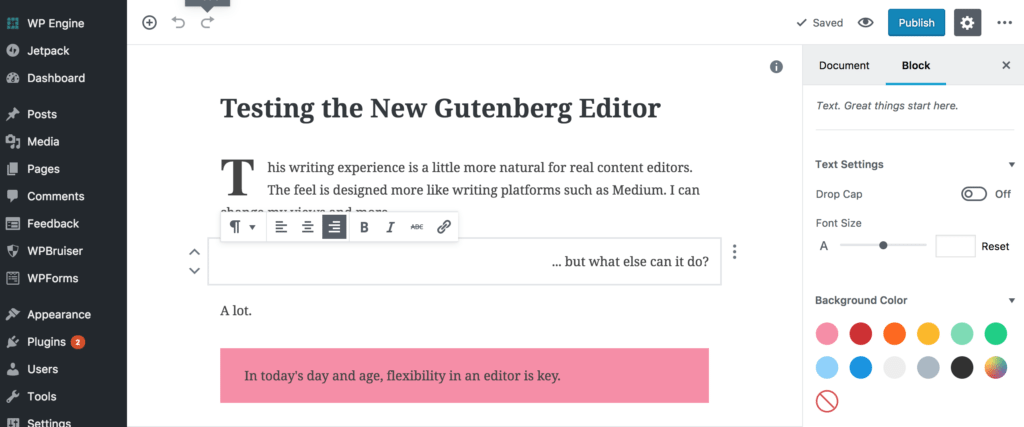If you’re in tune with the latest buzz in the WordPress community, chances are you’ve heard about the new editor WordPress has been developing. The Gutenberg editor is meant to replace the current WYSIWYG backend editor built into WordPress. The current editor hasn’t seen a facelift in quite a while, so this news may be alarming for some, and exciting for others.
The overall look and feel of the new Gutenberg editor is designed to feel more rich and enjoyable for content creators, similar to the editing experience on sites like Medium. The Gutenberg editor is currently in beta testing, but you can test it by downloading it as a plugin from your WordPress Admin Dashboard. It is expected to be released in WordPress 5 or higher.
What does this shift mean for WordPress sites? How can you be prepared? And what should the community expect in the coming months? We’ve got your questions covered below.
Why a new editor?
Earlier this year, Matt Mullenweg announced the Gutenberg editor as a marked shift in focus for WordPress core releases. Mullenweg noted that moving forward, WordPress updates would be focused on providing new features and making the editing experience better for authors. The new editor is the first of many changes demonstrating this user-inspired focus.
In choosing to develop a new editor, WordPress is seeking to add more of the most important usability features into its core feature set. Gutenberg seeks to remove the notion that users need extra plugins to manage something as simple as layouts.
What’s different?
To sum it up: A whole lot. The new editor is focused on flexible block-editing and ease of use, which means fewer behind-the-scenes code changes for editors.

This change is key for editors because it adds an element the current WYSIWYG editor does not: unity between the front-end and back-end. This means the changes you make in the back-end editor better reflect the appearance on the front-end.
This problem is one that page builders like Visual Composer, Divi, and Elementor among others have long tried to solve. By making this change, WordPress is actively shifting its focus to the ease of use and usability of the editor. WordPress is going beyond being the most widely-used CMS, to being the most user-friendly interface for any user as well.
As of now, Gutenberg is simply meant to be a back-end editor. After the initial release in WordPress 5, the focus will shift more toward customization, visual editing, and drag-and-drop elements.
Can I get a walk-through?
You got it!
How does the community feel?
Now that the community has had the chance to try Gutenberg, the reviews are out. Understandably, this big of a change stirs up a lot of mixed opinions out there. Most of the concerns from users stem from the unknown: What changes will I have to make to my current pages and Custom Post Types to be compatible? Will my theme’s templates work out-of-the-box? How do existing shortcodes work in the editor?
The WordPress Gutenberg team is working hard to absorb feedback and make changes based on the response from the community.
What should I do to prepare for the new editor?
Firstly, take some time to read more about the purpose and thought patterns behind Gutenberg. Then download it and use it! You can search for the plugin in your WordPress Admin Dashboard. To use it, you need to use the editor under the Gutenberg tab in your dashboard. Draft your next post with it, and make notes of what you can and can’t do with it. Last but not least, provide feedback to the Gutenberg team so they know what they need to make better before it’s officially included.
Are there more changes coming?
Definitely! The WordPress team is working hard to make Gutenberg awesome, user-friendly, and filled with new features. And, the Gutenberg team is working closely with those who have feedback in both Github and in the WordPress plugin reviews. The team is releasing updates and new features weekly! And, it’s not slated for release until at least WordPress 5, so there’s still time for improvement and bug fixes before then.
In the meantime, don’t stress too much. There will be time to test and use the editor before release, and even after. Since the WordPress team plans on allowing users to revert to using the old editor at least initially, you’ve got time to learn and adapt.
FAQ
Curious to learn more about the Gutenberg editor? Below are some quick FAQs from the Gutenberg community forums:
Can I use my theme templates with Gutenberg?
Yes, you can use theme templates similarly to how you use them now. In the Gutenberg editor, you can select the theme template you wish to use for layout and design on the right-hand side. Developers can release templates with Gutenberg in mind by coding for various design blocks which users can fill with their content.
What about my widgets and shortcodes?
Widgets and shortcodes work similarly to how they do now. The Gutenberg editor seeks to offer new ways to interact with those existing elements on your site. By making editable blocks for these elements, users have more control over the visual display of their content without having to know any code.
Will I have the option to use the standard WYSIWYG editor when Gutenberg is released?
Yes, at least initially. The WordPress team understands that integration of the new editor may take time. They have stated that when the plugin is officially released, users will still have the option to revert to the old editor. They are hoping more users will choose to use the Gutenberg editor, and to remove support for the old editor as soon as possible.
Will my page builder plugin work?
This is one of the elements that is unknown. That being said, the Gutenberg editor is just that: an editor, and not a page builder. For now, page builders that are dependent on shortcodes and widgets should have the ability to add them where needed. After the initial release of Gutenberg, the team is switching focus to Customization, which is where page building elements may see more conflicts and dual functionality.
Is Gutenberg meant to replace my page builder plugin?
No, at least not initially. For now, Gutenberg is only an editor. The team will be focusing on Customization after the initial release, which is when page builder plugins may begin to see conflicts. The idea behind Gutenberg was to avoid users piling on additional plugins for backend functionality or layouts. By baking in some of these features, the Gutenberg team is hoping to offer more features and functionality out-of-the-box.

Leave a Reply